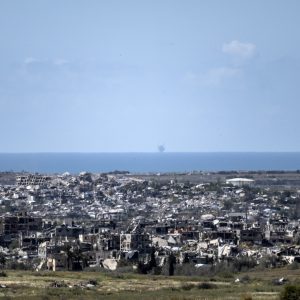Timbuktu ponders its future after Mali and UN declare failure of MINUSMA
Timbuktu, Mali (AFP):
Noisy motorbikes pass through the streets and in the market, as customers saunter between the stands.
It seems like just another day in Timbuktu — the northern Malian city whose name resonates from the Sahel’s glorious Islamic past to its conflict-ridden present as a result of foreign intervention and the rise of violent resistance groups.
Behind the scenes, though, many people here are worried as Mali’s ruling junta tussles with the UN over the future of its peacekeeping force in the country.
Last Friday, Mali called on the United Nations to remove its 15,000 personnel immediately, condemning what it called their “failure” to meet security challenges.
The demand comes as the mandate of the decade-old MINUSMA mission expires on June 30.
In Timbuktu, many people agreed that the force — the United Nations Multidimensional Integrated Stabilization Mission — had failed to roll back radical insurgency.
But others warned against its withdrawal, voicing concerns, especially for the local economy.
“MINUSMA has done nothing in terms of peace and stability in Mali,” said Aboubacar Maiga, a teacher. “We haven’t seen any significant change.”
Maimouna Sogore, a local woman, said, “I am not bothered whether MINUSMA stays or goes.”
Dangerous mission
In 2012, Tuareg rebels, abetted by radical fighters, swept through northern Mali.
The world was shocked by images of rebels destroying Timbuktu’s ancient mausoleums — a priceless heritage from the golden era of Islamic expansion.
France intervened to push back the insurgents and in 2013 MINUSMA began its long and controversial deployment.
Over the years, violent attacks have cost the lives of 187 personnel, two of them this month alone.
Today, the mosques in Timbuktu have been rebuilt and the city’s hoard of priceless Islamic manuscripts, which were squirrelled away to protect them from the insurgents, are safely stored in rebuilt libraries.
The city and its environs are considered secure up to a radius of some 30 kilometres. However, villages beyond that are under the threat of insurgents striking again.
Some initiatives undertaken by MINUSMA include repairing the highway between Timbuktu and the airport, installing solar-powered street lights around the town, renovating government buildings, improving water supplies and building sports facilities.
MINUSMA also helped ease traditional tensions between herders and farmers by setting down perimeters on land use.









